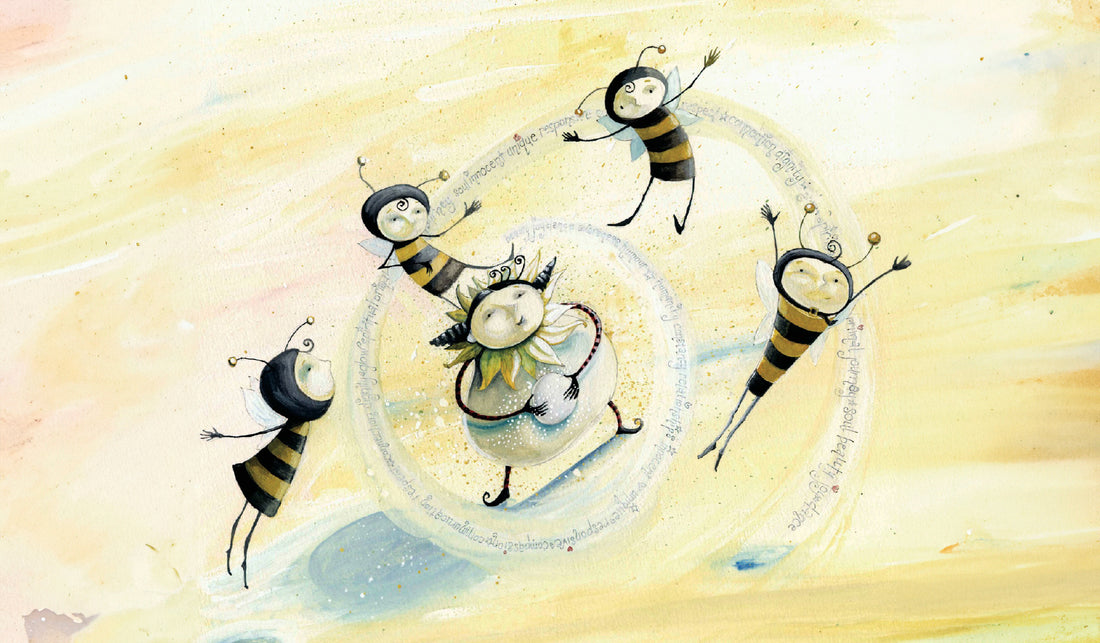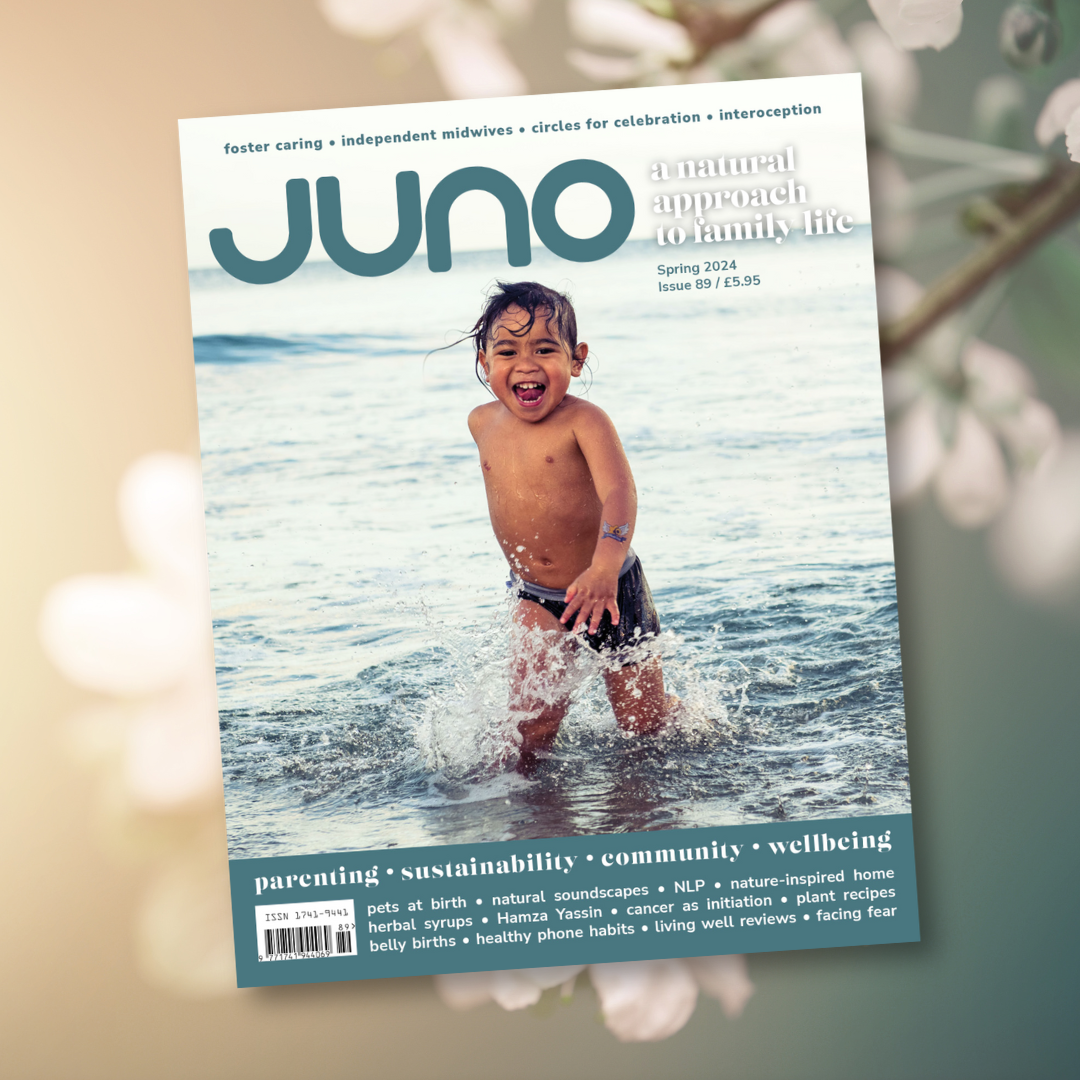I believe that the first five years of life are crucially formative, a foundation on which the personality of the child is built. As adults, we have daunting responsibility. If we are so busy with our adult lives that we are unable to become as children ourselves in order to respond with directness and clarity to the steady gazes that are so willing to trust and encounter us, we miss out on the beauty and joy of those early years. This dance of call and response is, to me, crucial for healthy development.
When our needs and interests clash (as they most certainly will) with the needs and interests of our children, there can be much disharmony and angst. Even in the most difficult of circumstances, a light touch of awareness and humour can allow us to see the ‘knee-jerk’ and unnecessary knots that we tie ourselves up in. Children do not need perfect parents and teachers (heaven forbid!) but they do need imperfect adults who are willing to share their imperfection and essential humanity with them and who enjoy their company – most of the time! How else can they learn to relate fully and fruitfully to others?
Certainly, there are times when children need our authority, but the intensity and rage with which we can tell our children off can betray our own unfinished business with past relationships.
As I meet my third grandchild for the first time, I marvel and venerate his perfection. He has not yet lived outside of the womb for a full day and already he is at home in the heart of his family. He is familiar to us: we seem to have met him before somewhere. He looks intently at us all with his opened, dewy eyes. Who said that babies can’t see? We make contact and are bewitched. I am overwhelmed by his beauty and daunted by the thought of the journey he has yet to make. How will he manage? How will he navigate a course through all the personal and global crises, the multifarious addictions on offer, the horror of wars and terrorism? One day, he may have to adjust to the demands of school. How will he fare in his relationships with his parents and siblings? What will his name be? For now, at least, he fully occupies the present moment and is blissfully unconcerned: his interest is to get his needs met. As I see it, he needs his mother to be there for him, as he roots for contact with her, whether he is hungry or not. He is unable to thrive without that constancy and surety. His physical and mental health depend on good contact with his mother. This baby will have to compete with his siblings for attention, and it is unrealistic to imagine that all his needs can be instantly met; but I believe that they must be reasonably well met for him to grow into health. Already, the urgency of his cry when he is uncomfortable has me on full alert. I’m all attentive!
His cries will not be ignored! “I’m here. I need attention now!” is the demand. If that innocent and primal demand triggers negatively our own unmet needs, the relationship with that child will not be straightforward. When our hopes and expectations for our children cloud directness of contact, the child becomes an object to meet our needs, rather than the unique and unknown being that he is. How can we see the newborn clearly without the veils of conditioning and filtering that can seem to be our unquestioned inheritance? How can we withhold the projection of our own wounded selves onto this being who is so full of mystery and unpredictability? Is it possible at all? What great awareness and presence of mind we need to step out of our own way, as well as the way of the young child, who makes sure that we will never forget his presence! We need to be constantly remembering and recollecting ourselves. I, myself, have found a much readier responsiveness with my grandchildren than I had with my own children.
Empathy, the necessary attribute for successful parenting, cannot take place unless we pause a little to gently ‘pull ourselves together’ in order to see the dynamics at play.
Compassion needs to be extended to our own parenting and teaching inadequacies or else we will live with the unnecessary burden of guilt and will compound situations that are already painful enough. I know of no human being who gets it ‘right’ all the time. In fact, it is extremely helpful to abolish the words ‘right’ and ‘wrong’ altogether. We can live more spaciously without such judgements on our behaviour. I think that communication is the key: communication with those neglected parts of ourselves, and communication with our children. How else can we get to know each other except through open dialogue? To pretend that we are not cross and cover crossness over with niceties or sweeties offered through clenched teeth and set jaw is to suppress an energy that could give us the relief and nurturing contact we need. To admit and own anger to a child, without storming at them or blaming them for the anger, is much easier and kinder to ourselves and the children than loaded silence or placatory cotton-wool words. Anger is much less likely to explode harmfully if allowed space in this way. The child will learn that her full spectrum of feelings will be permitted to breathe; her feelings will not be hijacked and washed over.
I recently heard a frazzled dad say to a child: “If you stop crying, we’ll go to the shop and buy some chocolate.” In my view, the child’s fragile distress was placated by a chocolate bar, and the dad unwittingly planted seeds of addiction and compulsion; not only that, but he also deprived the boy of the emotional resourcefulness which he will need so much. Another child, being taken to playgroup by her mum, insists that she doesn’t like playgroup. This child, too, wasn’t allowed her reality and was told, in no uncertain terms, that she loved playgroup! The fact that, at that moment, the child was experiencing a strong aversion to it was unheard and negated by her mum. I see these as examples of the ‘double bind’ situations that cause so much unnecessary distress in children and which are often the root cause of much mental distress in adults. When a child’s reality is under constant attack, he is left baffled and confused because the adults around him are not able to gently affirm and reflect back his reality.
When we are able to be with young children, to respond to them, rather than react to their behaviour, we enter a realm of deep respect for our own emotional processes as well as our children’s. With the power of respect and connection, we can be sympathetic to the child we once were and still are; we can allow that child to re-emerge. Effective relating brings positive nurturing response, and that interplay of call and response is what gives us personal power, dignity and humanity. How can we give that child our full-bodied attention when she needs it?
One play leader I worked with in the seventies, before playgroups came under the homogenising umbrella of education, sat in one place all session to the most wonderful effect. I saw her as a solid and benevolent presence for the children. The place she usually chose to sit was at the dough table. I never saw her scribble one note or observation; nor did she dole out progress reports to parents. She was always surrounded by small groups of children: they came and went, collecting her nectar like bees. The children glowed and animated with such sweet juice of the gods! She was always covered in flour because she loved to play with the dough as she chatted to the children. I find it hard to imagine such an easy, cosy and child-friendly scene in a playgroup or nursery today.
The ability to ‘disappear’ and merge with our surroundings diminishes as we get older and life makes its demands on us. The monks we call Venerable have spent lifetimes recultivating this ability to become one with the universe. Relating to young children gives us the opportunity to reawaken. They can be our spiritual directors and guides! How can we treasure and honour this one-pointed attention in ourselves and in our children? We can do much by providing play opportunities to engage us with our planet. The elemental materials are best: clay, sand, mud, water, dough and paints are all materials that can be offered to the under-fives, the over-fives and the over-fifties! Under-fives usually have a gutsy, full-bodied response to these materials, although a period of tentative watching may be part of the process for some and should be respected. Watch a young child at an easel move across the vast territory of paper, often with a brush in each hand, or observe a child encountering clay – thumping, slapping, smoothing, pinching and kneading – and we see that some very primal need is being beautifully met. We can see that something developmentally very vital is taking place: a growth into maturity that is both holy and wholesome, which is why we adults will nudge each other when we observe this magical process taking place. On some level we remember the true meaning of the verb ‘venerate’ and feel the presence of Venus, the Goddess of love!
We witness that an act of love is taking place and acknowledge that miracle. Allowing our children to ‘disappear’ in this way gives them the spaciousness and privacy they need to sink into the intimacy of their own beings. They are being essentially themselves; contact with that core of their authentic being will nurture their souls and strengthen them for the often hazardous journey through life. They can grow from this firm centre out into the environment instead of being forced through hoops they are not developmentally mature enough for. We certainly do not need to be moving them onto the next ever-receding rung of the ladder. We do not need to be anxiously and speedily scribbling notes (literally or mentally) on how they are doing. Regression, too, needs to be honoured as much as progression. We can learn to be ‘with’ without the pressure of having to teach them anything at all, without a learning intention in sight! We may then see that young children have a great deal more to teach us than we can ever teach them with all our clumsy ideas of what they should and shouldn’t be learning. Often it is just our quiet, approving presence and the comfort of our flour-dusted forearms that is needed. To lead children inwardly like this, we provide them with spiritual resources and superhuman powers that will ‘see them through’ the many manipulations, seductions, distractions and pitfalls of life.
____
Ruth Meyers qualified as a primary school teacher in 1972 and worked with children in schools, playgroups and nurseries for many years. She is now spending time harvesting those experiences through her writing, undertaking grandparent duties to her three grandchildren and volunteering for the charity Springboard for Children as a tutor at an inner London primary school. Ruth is very interested in spirituality and alternative education.
Illustration by Veronica Petrie
____
First published in issue 16 of JUNO. Accurate at the time this issue went to print.



